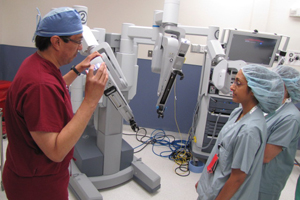Domo Arigato, Mr. Roboto

Saldivar works with obstetrics and gynecology students on the da Vinci minimally-invasive surgery simulator.
A collaborative agreement with an El Paso hospital and the Paul L. Foster School of Medicine Department of Obstetrics and Gynecology will ensure obstetrics and gynecology residents receive the latest training in robotic surgery by the time they graduate.
J. Salvador Saldivar, M.D., MPH, assistant professor in the Department of Gynecology Oncology, said the agreement with Las Palmas Medical Center would allow students to learn how to perform minimally invasive gynecological surgery on da Vinci simulator.
“El Paso is the first in the State of Texas to get a simulator for training,” said Saldivar, who is also director of the Resident Robotic Training Program. “No other OB/GYN residents in the state are training on da Vinci simulators and doing what our residents are doing.”
With the da Vinci training equipment, surgical procedures are simulated through realistic three-dimensional image software. The simulator guides residents through procedures to treat endometriosis, fibroids, prolapsed pelvic organs and gynecological cancer. Surgical procedures on the simulator are so realistic that puffs of smoke are visible after artery cauterization.
Although not all gynecological surgeries can be done with da Vinci, Saldivar said minimally invasive surgery with this type of equipment will become more common in the next few years as hospitals and insurance companies see the benefit to patients. Da Vinci surgery provides patients with the potential for outcomes equal or better than conventional surgery for many procedures, Saldivar said.
“Patients’ hospital stays and recovery are shorter, they demand less pain medication, there is less blood loss during their procedure and there is better cosmesis,” Saldivar said.
Related Stories
Celebrating Veterans: TTUHSC’s General Martin Clay’s Legacy of Service and Leadership
From his initial enlistment in the Army National Guard 36 years ago to his leadership in military and civilian health care management roles, Major General Martin Clay’s career has been shaped by adaptability, mission focus and service to others.
Texas Tech University Health Sciences Center School of Nursing Named Best Accelerated Bachelor of Science in Nursing Program in Texas
The TTUHSC School of Nursing Accelerated Bachelor of Science in Nursing (BSN) program has been ranked the No. 1 accelerated nursing program in Texas by RegisteredNursing.org.
TTUHSC Names New Regional Dean for the School of Nursing
Louise Rice, DNP, RN, has been named regional dean of the TTUHSC School of Nursing on the Amarillo campus.
Recent Stories
The John Wayne Cancer Foundation Surgical Oncology Fellowship Program at Texas Tech University Health Sciences Center Announced
TTUHSC is collaborating with the John Wayne Cancer Foundation and has established the Big Cure Endowment, which supports the university’s efforts to reduce cancer incidence and increase survivability of people in rural and underserved areas.
TTUHSC Receives $1 Million Gift from Amarillo National Bank to Expand and Enhance Pediatric Care in the Panhandle
TTUHSC School of Medicine leaders accepted a $1 million philanthropic gift from Amarillo National Bank on Tuesday (Feb. 10), marking a transformational investment in pediatric care for the Texas Panhandle.
Texas Tech University Health Sciences Center Permian Basin Announces Pediatric Residency Program Gift
TTUHSC Permian Basin, along with the Permian Strategic Partnership and the Scharbauer Foundation, Feb. 5 announced a gift that will fund a new pediatric residency.
